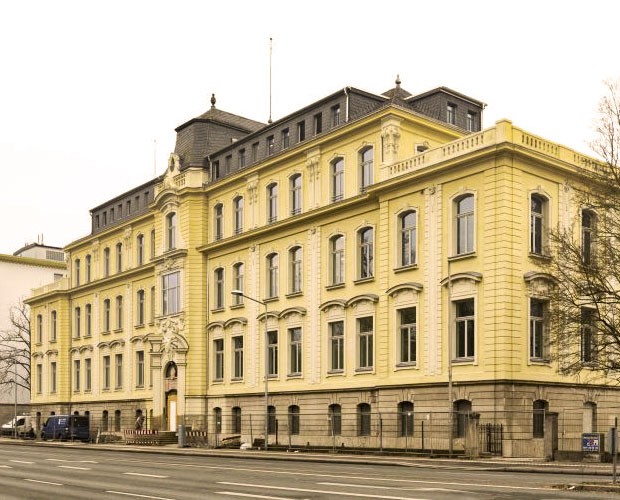About Us
Operating in the international growth markets for life sciences and medicine/(bio)medical engineering, since its foundation in 1987/1992 the Fraunhofer Institute for Biomedical Engineering (IBMT) has worked primarily as a technology developer and device manufacturer for customers from all over the world. As a founding member of the Group for Health of the Fraunhofer-Gesellschaft, which now comprises six institutes and one research establishment, the Fraunhofer IBMT cooperates closely with its industrial customers as well as public and private customers. The IBMT's strategy is focused on the areas of biomedical/medical engineering (especially non-invasive and minimally invasive as well as miniaturized technologies), biotechnology, intelligent sensors, implants, cryotechnology, biobanks and stem cell research. Trend-setting automated laboratory technologies, the development of mobile special laboratories (S3, GMP, GCLP, etc.) and information technologies for healthcare solutions round off the portfolio of the Fraunhofer IBMT. Decades of expertise in biotechnological and medical research and development fields also allows us to solve a variety of purely technical tasks. This includes ultrasound-based level metering, special transducers for acoustic applications, sonars, but also microelectrodes and miniaturized manipulation systems as well as automated in vitro culture devices.
With a good balance between basic and applied research, the institute promotes the "lived" technology transfer in medicine and biotechnology, laboratory technology, food, chemical and pharmaceutical industries and environmental technology as well as in other areas of industry and knowledge-intensive services. For many years, the Fraunhofer IBMT successfully has been working in the field of stem cell research and has been the first institute of the Fraunhofer-Gesellschaft to obtain licences (No. 18, 19 and 44) of the Robert Koch Institute to import and use human embryonic stem cells for scientific purposes. In recent years this has been extended to the production and characterization/expansion of induced pluripotent stem cells (iPSCs). The institute is involved as part of a major European project in building an international iPS cell bank.
Core competencies of the Fraunhofer IBMT are:
- biomedical/medical engineering
- molecular and cellular biotechnology/medical biotechnology
- bioprocessing and bioanalytics
- nano(bio)technology and molecular diagnostics/therapy
- cryo(bio)technology from cryoprocedures to cryomicroscopy
- design and contruction of small, medium-sized and large biobanks
- stem cell research and cell differentiation
- tissue engineering and development of new in vitro culture systems
- intelligent sensors
- implants
- theranostics
- neuroprosthetics and technical implant components
- (mobile) laboratory technologies, new concepts for wireless energy supply
- medical and technical ultrasound applications
- sonar technologies
- autonomous deep-sea systems and acoustic imaging
- sensor manufacturing/microsystems technology
- telemetric data and energy transmission
- multi-local sensors connected by communications technology
- biomedical data and bioethics
- health information systems/medical networks
The technology transfer from basic research is carried out along the innovation rail ranging from scientific-technical consulting, feasibility study, prototype development, field testing, right up to manufacturing technology. Spin-off companies of the IBMT take over, as necessary, system manufacturing as a service, so that the fastest possible implementation of our customers´ needs right up to market readiness is assured. Further business segments include the consulting for venture capital (VC) companies, the compilation of studies and expert assessments as well as support for start-up companies. The IBMT has been active in Saarland and, since early 2012, in North Rhine-Westphalia (Münster). 2015 saw the addition of a liaison office in the Fraunhofer-Forum Berlin. In 2017, a project centre for stem cell process technology was initiated in Würzburg together with the Fraunhofer ISC, bringing together the materials science expertise of the Fraunhofer ISC and the expertise in establishing biomedical workflows in the field of induced pluripotent stem cells (iPS) of the Fraunhofer IBMT at a single location. Acquisition and customer care take place on a global basis.
The institute is funded through research and development contracts of public and private (mainly industrial) customers. The conjunction of broad technological expertise and profound knowledge in the fields of medicine and biology as well as the availability of state-of-the-art technologies from ultrasound, microsystems technology, cryotechnology and nanotechnology, right up to IT and simulation, gives it an outstanding position in Europe.
With the foundation of the Institute for Biomedical Engineering, i. e. a precursor thereof, by Prof. Dr. Klaus Gersonde in 1987, the Fraunhofer-Gesellschaft was pursuing the aim of advancing natural science and engineering research, modern technology and the technology transfer in the field of clinical research in Saarland in cooperation with the university clinics in Homburg/Saar, the University of Saarland and the institutes of the Helmholtz and Leibniz communities as well as the Max-Planck-Gesellschaft.
The institute is based in Sulzbach and St. Ingbert (Saarland) with a branch in Münster/Wolbeck (North Rhine-Westphalia) and Berlin. Since January 1, 2015, the Fraunhofer Institute for Biomedical Engineering IBMT is headed by Prof. Dr. Heiko Zimmermann as Managing Head of Institute. Through its Chair of Molecular and Cellular Biotechnology/Nanotechnology, IBMT is connected with the Faculty of Chemistry, Pharmacy, Biosciences and Materials Sciences of University of Saarland. In 2012, Prof. Dr. Heiko Zimmermann was appointed by the executive board of the Fraunhofer-Gesellschaft as the second head of institute to take over the direction of the Fraunhofer IBMT after the retirement of the former Managing Head of Institute. Prof. Dr. Günter Rolf Fuhr, who headed the Fraunhofer IBMT since April 1, 2001 and, at the same time, followed a call from the Chair of Membrane Physiology at the Humboldt University Berlin to the Chair for Biotechnology and Medical Technology at the Medical Faculty of the University of Saarland. Prof. Dr. Ralf Oetinger links the Fraunhofer IBMT with the Hochschule für Technik und Wirtschaft des Saarlandes – University of Applied Sciences of Saarland (htw saar). On this basis the institute has an excellent training and college competence, which is manifested in a wide range of graduation works (from master degrees to doctorates right up to junior professorships and habilitation) and a busy scientific life.
When it was founded, the IBMT was the 45th institute in the community of now 76 institutes and research units.




